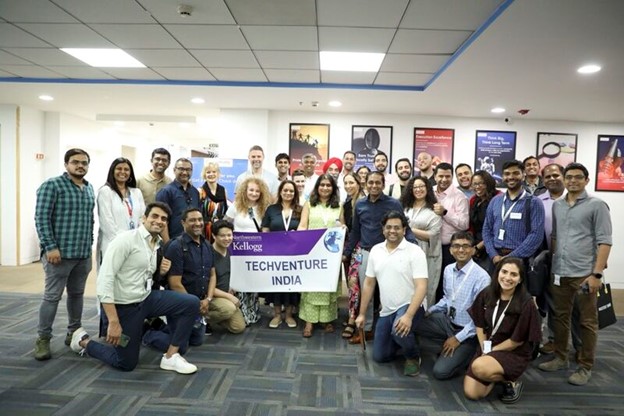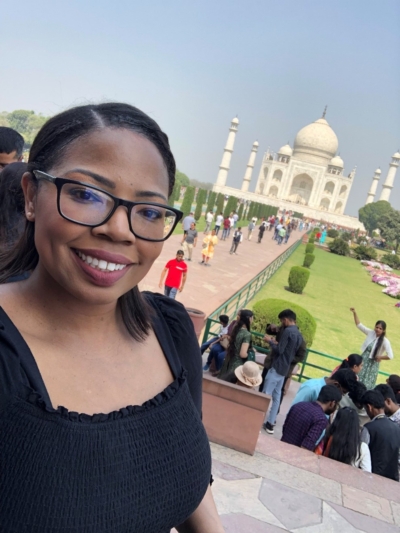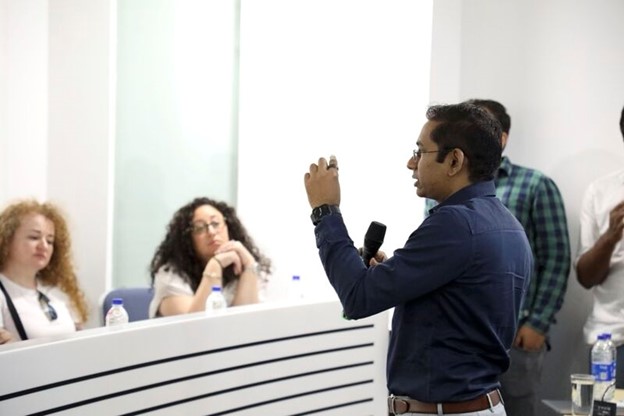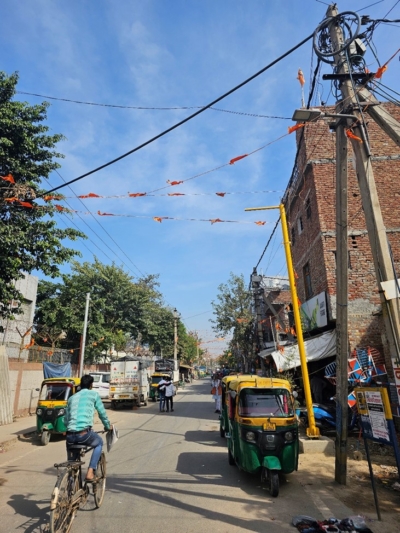
TVI students meet with MediBuddy co-founder and CEO Satish Kannan in Bangalore, India.
Reflecting on my experience in Kellogg’s EMBA Tech Ventures global elective, I didn’t just gain classroom knowledge. I also picked up insights gleaned from an immersive experience that took me from my home in Chicago to the dynamic cities of Delhi and Bangalore in India.
This journey has been both humbling and transformative, highlighting the significant impact of innovation and optimism in shaping a brighter future. As I participated in alumni events, industry panels, and discussions with women entrepreneurs, I found myself immersed in a world where razor-focus on a problem statement and unwavering perseverance drives innovation. On campus, we explored the distinctive ecosystem and trends within India. After we arrived in India, we learned about why launching and scaling a start up in India is ideal place for such ventures. As we met with founders and CEOs of remarkable companies, a recurring theme emerged: they all possessed a passion for creating solutions to solve problems to elevate and propel India forward.

Selfie of Lena Zell at the Taj Mahal in Agra, India.
CLASS FORMATTING ALLOWS FOR DEEPER UNDERSTANDING
The journey started on Northwestern’s Evanston campus, where we learned about India’s unique trends, technology ecosystems, and the challenges associated with creating solutions at scale for a nation with 1.4 billion people. The classroom instruction laid the groundwork for what we would see in country. We explored topics such as the Indian startup landscape and drew comparisons between Silicon Valley in the U.S and the role of technology ecosystems for nurturing innovation. My peers and I were so excited for our classroom sessions on Generative AI, Cloud Computing, and the Mobile Revolution.
We also discussed the crucial role that policymakers play in enabling or hindering development. We learned that the Indian government has developed a pioneering Digital Public Infrastructure (DPI) system. At its core, DPI is a digital toolkit that simplifies access to essential services for citizens, including a unified payment system, verified identity management, and data protection. Essentially, DPI uses digital innovation to tackle socio-economic challenges, improve quality of life, and ensure that all citizens can participate in the economy.
Bridging the conceptual insights with practical exposure, the journey transitioned from the classroom to the streets of India under the guidance of esteemed Professor Mohan Sawhney. This shift from conceptual insights to practical exposure vividly illustrated the tangible impact and value of an immersive global elective. Global electives for EMBA students provide exposure to international business practices and diverse viewpoints, which are crucial for thriving in a globalized world. They are an invaluable part of any educational path, offering significant benefits from both a personal-growth and professional perspective.

TVI students meet with MediBuddy co-founder and CEO Satish Kannan in Bangalore, India.
EXPANDING MY TECH KNOWLEDGE VIA INDIA’S LANDSCAPE
I believe the core objective of most companies is to develop solutions that effectively solve problems while prioritizing the needs and interests of their customers. I saw this statement brought to life in India when we visited Fusion Microfinance, a company that provides small loans to low-income individuals who otherwise would have no other access to financial services. Upon meeting Mr. Devesh Sachdev, founder and CEO, we learned about Fusion Microfinance’s loan structure and how they provide small loans to build businesses that included livestock, weaving, woodwork and other small enterprises. He spoke passionately about why he invests in these areas: he sees potential for all Indian people and that includes gender equality and women’s empowerment.
Our visit to one of Fusion’s small branch offices in the rural village of Bawana was equally eye-opening. There, I met with a husband-and-wife team who used a micro loan to buy a loom so that they could weave and sell clothes to support the family and pay school fees. Upon entering their home, the loom was placed in a prominent position in their small two room dwelling. The husband proudly identified his wife as the business owner and himself as the operations person. They took great satisfaction in their ability to improve their children’s lives and uplift their community.
In Bangalore, we visited Medibuddy, a health-tech company that is also making a significant impact on the lives of India’s rural population. Their goal is to make high-quality healthcare accessible at scale via an online platform utilizing components of India’s DPI. This platform connects underserved rural populations with essential services, including online doctor consultations, lab test bookings, medicine delivery, and various other services.

Rural village in Bawana, India where TVI students did an on-site visit to meet at one of Fusion Micro’s branch offices.
During our visit, we had the opportunity to meet with CEO and co-founder Satish Kannan, who shared insights into his entrepreneurial journey. He discussed the initial concepts that did not succeed and how he eventually developed a viable solution to provide healthcare access for underserved communities. His company’s mission is to “combine the healthcare domain, science, AI technology, and human intervention to provide world-class preventive and therapeutic healthcare services.” MediBuddy has become India’s largest digital healthcare platform, significantly impacting the democratization of care.
FROM TECH VENTURE TO TANGIBLE IDEATOR
As a capstone for the course, we are tasked with developing a startup concept that integrates our industry experience, understanding of the challenges facing the Indian people and feedback from CEOs and various founders. Currently, India lacks a unified emergency service similar to the 911 system in the US. To address the needs of people in distress, my group is putting together a concept that provides the means for key demographics to alert and request assistance via a unified mobile app. We are aware of the challenges with real-life implementation. However, my time in India has highlighted the critical role of rugged persistence to push the boundaries of what is achievable. The same sentiment holds true for some of my classmates. Inspired by companies like Medibuddy and Fusion Microfinance, some of my classmates have decided that the paper concept is not enough: they want to turn their start-up idea into a real business in India. This is the power of Tech Ventures India and the entrepreneurial spirit it fosters.
As I move forward, the insights gained from this elective will be invaluable in my continued pursuit of innovative solutions to complex problems, both in my role at Cisco Meraki and beyond. The journey through India, coupled with my military background and professional aspirations, has filled me with a deeper appreciation for the intricacies of global technology markets and the critical importance of empathetic, user-centric innovation.
Go to next page for additional pictures from the Tech Ventures trek to India.

Lena Zell
Bio:
Lena Zell is a Solutions Engineering Leader at Cisco Meraki. Leading a dynamic sales team, she is responsible for catering to small business customers across the US West Coast, US South, and small to mid-market customers in Latin America. Her primary focus lies in acquiring new customers and efficiently scaling operations to meet the demands of her extensive geographic customer base. Lena brings close to 15 years of valuable experience to her role at Cisco, having initiated her technology journey in the military as a member of the United States Marine Corps.
- EMBA Cohort 132- Graduation June 2024





Questions about this article? Email us or leave a comment below.